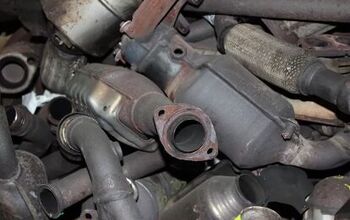Nation Writer: American South Needs UAW STAT
"Oh, the poor unions!" says Max Fraser, a "2006 Intern" now scribing full time at The Nation. The budding curmudgeon supposes that The Big 2.8 will be the death of the unions (not the more likely murder-suicide). That's because Detroit's robber barons just keep squeezing those wages and benefits. Unfortunately, his explanation of how this is happening, and why we all should be worried is… well, let's just say Mr. Fraser has penned the Chrysler Sebring of rants. In a sweeping example of internally-inconsistent analysis, Fraser manages to blame Toyota and Honda for paying their workers more than UAW guys make– and then urges the UAW, for the good of the workers, to get into Toyota and Honda's factories as soon as possible. Fraser also manages to insult and put down outsourcing, insourcing, rural areas, and the "Third Worldization of the American South." Gee, with all those corporate headquarters in the South (Coca Cola, Nissan, Wal-Mart, Saks Department Stores, Home Depot, UPS, Bank of America, Lowe's, Wachovia, Sprint-Nextel, just to name a few), a $3b biotech industry in North Carolina's world-class research triangle, and the busiest airport in the world, the "Third World American South" sounds like a pretty productive place to me.


































Comments
Join the conversation
"The only way for the unions to remain relevant is to unionize the presently non-union foreign-owned factories, in order to demand more salary and benefits and drive their labor costs up to Detriot-like levels." Baring massive federal government intervention in the markets this is never going to happen. Given that the US has hog-tied itself with various trade agreements there is pretty much no chance of erecting import barriers to keep imported cars out. So if the UAW somehow managed to drive up the costs for transplant factories those factories would simply close. Then there would be no US based auto manufacturing at all.
jthorner, Maybe, maybe not. Mexico has been an option for a while -- ever since NAFTA -- and while some plants have moved down there (Ford, for instance), many foreign companies are still choosing the U.S., albeit the less expensive parts (which are still more expensive than Mexico). Similarly, we've been importing all sorts of cheap junk from China for years now, but cars haven't been part of that mix yet. Many electronic components are made in places like Malaysia, but we don't see too many badge-engineered Protons on American roads either. Much of the low-skill work has been beaten out of auto-making through mechanization, and having a higher-quality workforce is worth the extra price. Even though U.S. labor costs are higher per man-hour, locating here may in fact be the all-around cheapest option, because you get so much more per man hour, you can save transport costs, etc. Considering the fact that foreign automakers are opening new plants here as we speak, we have to assume that they are not just locked-in to a losing labor market, but actively find the U.S. attractive. If we assume that carmakers benefit (i.e. profit) to some extent from being in the U.S. as opposed to Mexico, then we have to ask how these "spoils" are split. The consumer might see some savings through lower costs (or higher quality for the same money). Or the corporation might not lower prices as far as possibe, and keep some of the excess as cash profits. Or the workers could unionize and demand higher wages, cutting into consumer savings and corporate profits. Or, as is the case, all three could happen to some extent. If the unions amass very great bargaining power, they could try to keep most of the benefit of being in the U.S. for themselves, as opposed to splitting it among the other groups. As long as they do not overreach, they could demand at least somewhat higher wages and benefits without seeing their jobs migrate to Mexico. That's what they're after.
"Amass great bargaining power" means unionize the foreign-owned plants in the south, in addition to the domestic plants that have long been unionized. That way, the UAW has a monopoly over the automobile factory labor supply across the U.S., and can extract uniformly high salary and benefits packages from all factories in this country, instead of having some factories with significantly higher costs than others. I think we can both agree that if the UAW does not manage to unionize the southern factories, and remains entrenched only in the old Detriot plants, they will be subject to harsh competition from non-union shops and their bargaining power will continue to erode. Moving into the non-union plants in the south was the whole point of the original article, and that is the way in which they could manage to amass this elusive bargaining power.